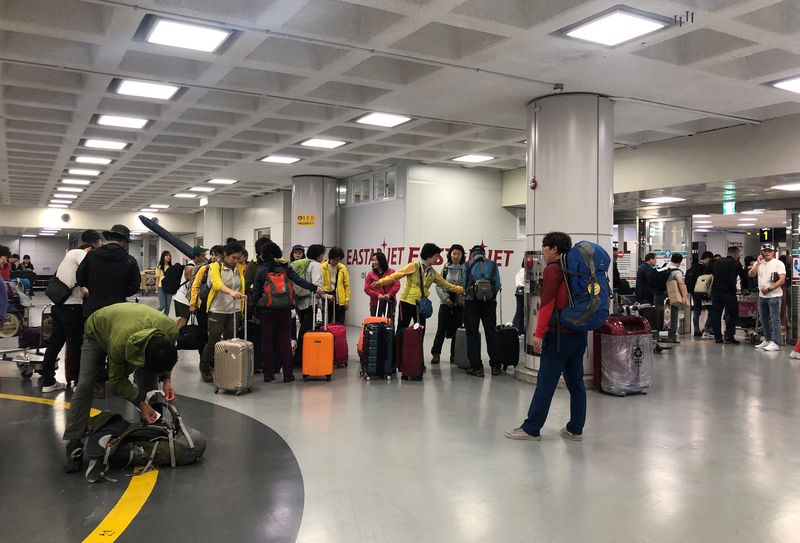By Heekyong Yang
JEJU, South Korea (Reuters) - Kim Bo-Min, a Starbucks (NASDAQ:SBUX) barista, paid 140,000 won ($118) for a round-trip from her hometown of Daegu to the popular resort island of Jeju, arriving on T'Way Air Co Ltd, part of South Korea's rapidly growing low-cost airline sector.
The route between Jeju and Seoul has in fact emerged as the world's busiest domestic one as travelers like Bo-Min flock to the southern resort island, lured by cheaper rates from budget carriers. The 28-year-old barista would have paid 22% more if she had flown Korean Air Lines Co Ltd.
"I have taken both full-service airlines and budget carriers for my previous Jeju trips, but I do not think there is much difference when it comes to services," she told Reuters after her flight of under one hour to Jeju.
Korean low-cost carriers (LCCs) have cornered a large chunk of the domestic market since Jeju Air Co Ltd launched in 2005 with five Q400 turboprops, turning up the heat for bigger players like Korean Air and Asiana Airlines Inc and pushing them to start their own budget brands.
Jeju Air is South Korea's No.3 airline by revenue, operating 6 local and 66 international routes with 42 Boeing (NYSE:BA) 737-700 jets. In November, it placed a $4.4 billion order for 50 737 MAX jets.
The budget airline boom has fueled a spike in travel to Jeju, with the number of tourists jumping almost three-fold to 14.3 million over 2005-2018 from 5.3 million, Jeju Tourism Association data shows. https://tmsnrt.rs/2WEa5b8
South Korea's five no-frills carriers had a 61% share of the Jeju travel market in 2018, according to data firm OAG.
"Not too long ago, many South Koreans found air travel a luxury, but perception has changed as budget carriers brought us lower fares, allowing more affordable travel," an official at Korea's Airports Corporation's Jeju International Airport said, declining to be named due to company policy.
SOUTH KOREA LEADS
In broader North Asia, LCCs have been slower to take off than in other parts of the world, due partly to slow-moving Chinese policies, a domestic aviation duopoly in Japan and Cathay Pacific's dominance of the Hong Kong market.
But South Korea, host to the high-profile International Air Transport Association annual meeting in Seoul this weekend, is the outlier, with local start-ups like Jeju, financially backed by the Jeju Island government, being encouraged to grow.
The country's transport ministry in March issued aviation business licenses to three additional budget carriers, further crowding the industry and intensifying competition.
The 53% domestic market share of carriers like Jeju and Jin Air Co Ltd outstrips the 9% LCC penetration in Japan and 13% in China, data from CAPA Centre for Aviation shows.
Internationally, South Korean LCCs have rapidly expanded on routes to nearby destinations like Japan, Vietnam and China with narrowbody jets, with their market share growing to nearly 57 percent on international routes to Japan in 2017, from 44 percent in 2016, according to South Korea's transport ministry.
"We should not underestimate how important the role of budget carriers are on a given route," said Park Seong-bong, a senior analyst at Seoul-based Hana Financial Investment.
INCUMBENTS FEEL THE HEAT
With the fleet size of the country's budget carriers jumping three-fold over the past five years, legacy carriers Korean Air and Asiana are feeling the heat.
Korean Air's operating profit fell over 40 percent to 640 billion won ($537 million) in 2018 from 1.1 trillion won in 2016, while Jeju Air's operating profit nearly doubled to 100 billion won over the period.
Korean Air's budget arm Jin Air has come under a lot of pressure in the wake of public outrage over the behavior of members of its founding family, while financially troubled Asiana's largest shareholder has put its stake up for sale.
Their pains have meant gains for independent budget carriers like Jeju Air and Eastar Jet as they expand their long-haul routes such as Busan-Singapore to attract more customers.
"For long-haul routes, customers tend to seek more premium services which used to be found in full-service carriers. We are now providing business-class like services at more competitive prices," said Lee Dae-woo, a deputy general manager at Jeju Air.
